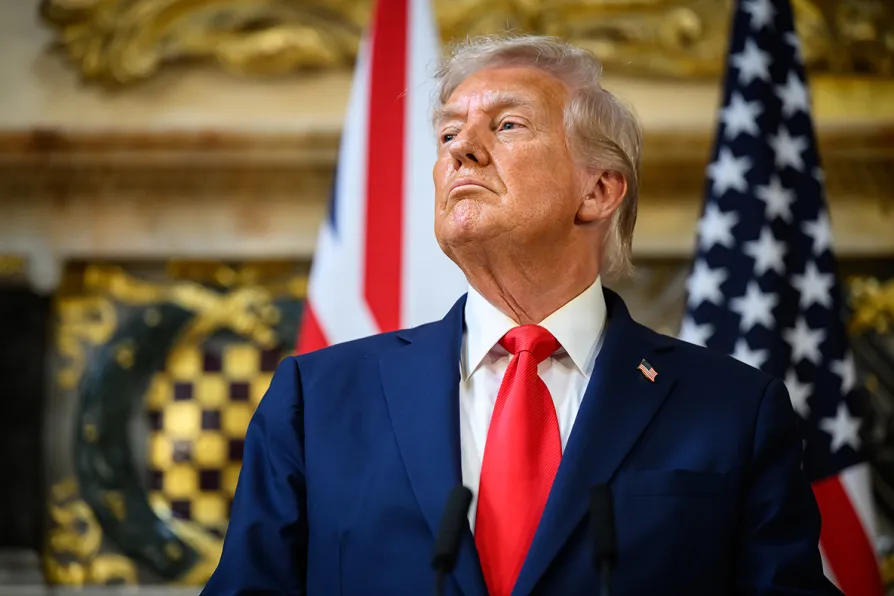John Wojcik pays tribute to a black US activist who spent six decades at the forefront of struggles for voting rights, economic justice and peace – reshaping US politics and inspiring movements worldwide
In Washington, the willingness to accept an open war with Russia is growing — at Europe’s expense. While Nato states are being drawn into confrontation, Europe risks becoming the battlefield of a potential world war, warns SEVIM DAGDELEN

 US President Donald Trump during a press conference at Chequers, near Aylesbury in Buckinghamshire, on day two of the president's second state visit to the UK ,September 18, 2025
US President Donald Trump during a press conference at Chequers, near Aylesbury in Buckinghamshire, on day two of the president's second state visit to the UK ,September 18, 2025
THE US president is initiating a 180-degree shift in his Ukraine policy. Donald Trump now appears convinced that Ukraine can reclaim all its territories from Russia — including Crimea. He seems willing to initiate a full-scale escalation of the war in Ukraine to achieve this. However, it is not the US that is meant to wage this war against Russia, but the EU and Nato.
The escalation has been prepared over the past weeks, with Russia repeatedly blamed for alleged threats against top EU officials and violations of Nato airspace. For example, the accusation that Russia disrupted the GPS signal of EU Commission president Ursula von der Leyen has since fallen apart.
The alleged violation of Estonian airspace stems from a dispute between Estonia and Russia over international airspace in the Baltic Sea. It appears that Estonia unilaterally extended its previous three-mile coastal zone to 12 miles, in order to then accuse Russia of violating its airspace.
It is hardly credible that the small Baltic Nato member undertook these steps without backing from Washington. Indeed, Tallinn could count on the support of its Nato partners in the Nato Council when it raised the alleged Russian border violation there. US President Trump promptly declared his willingness to have Russian aircraft shot down.
Nato’s entry into the war — according to Washington’s script?
This had already been announced in the UN security council by Polish Foreign Minister Radoslaw Sikorski — the same minister who once celebrated the terrorist attack on the Nord Stream pipeline on X. German foreign policy officials, such as Jurgen Hardt from the CDU, also backed the policy of escalation and announced their willingness to shoot down Russian aircraft — fully aware that such an act by German planes would amount to Germany entering the war.
All signs point to a script coming from Washington, reviving the old war goal of Joe Biden and Annalena Baerbock — to “ruin Russia” — and now playing with the idea of a direct Nato intervention against the nuclear power. This US strategy of escalation is flanked by an intensified trade war against the Brics states, now directly targeting China as well.
For a week now, Poland has been blocking border crossings into Belarus — cutting off the most important trade route between China and Europe. Initially justified by a joint Russian-Belarusian military exercise, the border remains closed even after the drills have ended. The goal seems to be to dictate China’s trade policy — with significant additional risks for the economies of EU member states, which are putting their relations with their most important trading partner at risk.
Rollback in Latin America: world war as collateral damage?
The US is not only pursuing a more confrontational policy in Europe. In Latin America, it is once again pushing regime change under the pretext of the war on drugs — much like in the 1970s. In Argentina, for instance, where Trump ally Javier Milei is responsible for the total collapse of the Argentine peso and the economy, the US now plans to keep the country afloat with billions in loans — to prevent its protege from completely crashing in the upcoming midterm elections in October.
The US rollback policy from the cold war era is back — and that includes propping up its own autocratic allies. One must now reckon with the US’s willingness to fully escalate. Apparently, a decision has been made to even risk world war — in the hope that the US itself can stay out of it. For the peoples of Europe, however, this scenario poses an extreme danger.

The cancelled China trip of the German Foreign Minister marks a break with Helmut Schmidt’s China policy and drives Germany further into Washington’s confrontation course, warns SEVIM DAGDELEN

In a speech to the 12th Xiangshan Forum in Beijing, SEVIM DAGDELEN warns of a growing historical revisionism to whitewash Germany and Japan’s role in WWII as part of a return to a cold war strategy from the West — but multipolarity will win out

In the first half of a two-part article, PETER MERTENS looks at how Nato’s €800 billion ‘Readiness 2030’ plan serves Washington’s pivot to the Pacific, forcing Europeans to dismantle social security and slash pensions to fund it










